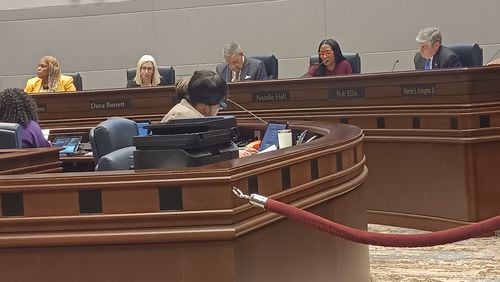Fulton County faces a conundrum on providing rides to its senior citizens: It’s a service the county offers, and wants to continue; but as more people use it, costs keep rising.
That has county officials looking at ways to keep costs down. Should they raise prices? Reduce the number of rides allowed? Limit use to people who can’t afford an alternative? Charge on a sliding scale?
Despite months of intermittent debate, they haven’t decided. And on Wednesday, county commissioners again postponed a decision by at least two weeks.
The program now takes seniors to doctor’s appointments, shopping trips and any other personal errands. Common Courtesy, the county’s contractor, schedules trips through Uber or Lyft from 8:30 a.m. to 5 p.m. Monday through Friday, said Ladisa Onyiliogwu, director of the county Department of Senior Services.
To use the service, people must be at least 60 years old, a Fulton County resident, able to use a cellphone, and capable of getting in and out of a car unaided, said Rafael Patterson, Senior Services program manager.
Riders can sign up with a one-time $15 registration fee. After that each ride — up to 16 a month — costs $1. Trips for medical care are limited to 15 miles one-way, and all other trips to 10 miles one way. Riders can take one round trip, counted as two rides, per day. They must have a debit or credit card on file to be billed monthly.
The Uber/Lyft rides are separate from the county’s Transdev program, which offers ride-shares to medical appointments and county senior-service facilities.
There are 6,710 people registered for the Uber/Lyft service but fewer than half of those actually use it, Onyiliogwu said. Ridership grew from 523 seniors taking about 45,000 trips in 2019 to a projected 2,837 users taking up to 192,000 trips this year, she said.
But that increased use has driven up the cost. Common Courtesy’s latest annual contract was for $3.1 million, and this week Senior Services asked for an additional $1.5 million. Even that might not last out the year unless there is some way to control the growth of ridership, according to Pamela Roshell, county chief operating officer.
Active riders average eight trips per month, meaning four round trips, Onyiliogwu said. If all those who are registered used the service that much, or if enough new people sign up to equal that, the cost could hit $15 million a year, she said.
About 20% percent of Fulton County’s population is potentially eligible to use the service, Onyiliogwu said. That’s approaching 200,000 people, and seniors remain the fastest-growing segment of the population, she said.
Senior Services staff said suggestions to add a means test to use the service would be cumbersome, add to administrative costs and that seniors would likely be reluctant to hand over their financial details. Instead the department recommended raising the price to $4 per one-way ride.
Every commissioner weighed in on the issue Wednesday. Chair Robb Pitts scoffed at the claim that the administrative burden of a means test would be too great.
“None of that makes any sense to me with the staff that y’all have,” he said.
Commissioner Dana Barrett quizzed Onyiliogwu on how Senior Services staff researched their claims.
“Did we survey our seniors? All of them, countywide?” Barrett said.
Onyiliogwu said no, but staff have a “pretty good idea” of what users think from regular contact.
Barrett remained skeptical of the department’s objections to a means test and asked for a breakdown of projected costs.
Commissioners have previously signaled disapproval of capping ridership or lowering the number of allowed trips, so now staff are looking at “different iterations of sustainability,” Roshell said.
Commissioner Marvin Arrington Jr. said the county probably has most of the information it needs on eligibility or even potential means tests.
“We’re having multiple people in multiple departments input the same information on the same people over and over again,” he said. Arrington asked if all that scattered county information could be consolidated.
County Information Technology Director Kevin Kerrigan said some software platforms could do so. Arrington pushed him to investigate that.
Commissioner Bob Ellis said he agreed with Senior Services staff in arguing against a means test, which he said would be onerous for people who just want a ride to the grocery store.
Commissioner Bridget Thorne also agreed with that. Raising the per-trip price might be the only feasible option, but that price hike wouldn’t have to be permanent, she said.
Barrett said the county wouldn’t have to demand proof of income, it could just ask seniors and “take their word for it.” That would cut down on administrative costs and could be revisited if abuse became evident, she said.
Commissioner Natalie Hall suggested charging for rides on a sliding scale. Some of her senior constituents can barely afford the current $1 charge, she said.
Hall also said seniors should be polled for their preferences.
Commissioners voted to hold any action until at least their next meeting, May 15.
About the Author







